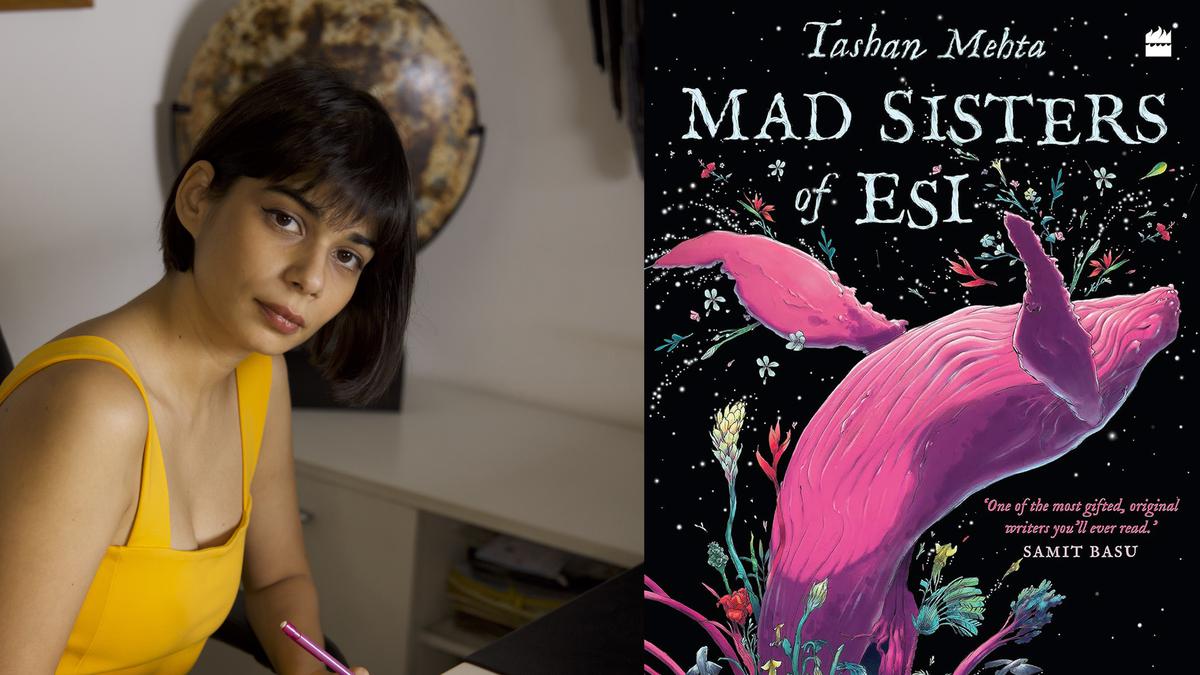
‘My book is a love letter to our wildness’ | Tashan Mehta on her new fantasy novel ‘Mad Sisters of Esi’
The Hindu
Mad Sisters of Esi is a love letter to wildness, a madcap novel of fables, myths, and dreams. Tashan Mehta's new novel transports readers to a maze of alternate universes with delightful female characters. In this interview, she talks of her struggle with imagination and why she chose the theme of madness. Mehta's characters are inspired by an awe of nature and her mission to create South Asian stories with dominant culture values.
In author Tashan Mehta’s own words, her new book, Mad Sisters of Esi, is “a madcap, joyful, very strange novel about two sisters and their quest across three universes. It is essentially a love letter to our wildness”. The book of fables, myths, and dreams transports the reader into a maze of alternate universes with delightful female characters.
In a Zoom call from Goa, Mehta says that Mad Sisters has been through an arduous journey of 24 drafts and five versions. She talks of the struggle of her failure with imagination and why she chose the theme of madness. Edited excerpts:
This comes down to the nub of the crisis I had when I was writing this book, which was a failure of imagination. When you start thinking that you want to write about magic, your imagination instantly goes down a particular pathway because it has seen many such stories. The more I couldn’t imagine new narrative structures, the more the book read like every single book I had read earlier.
And so, I began thinking, what is truly interesting to me? It is everything that lies outside of understanding, of consciousness. That’s madness; it seems larger than the bounds of our reality. And when I started thinking that way, I started thinking of the wonder that comes with that but also the terror. Madness is wildness, but also sublime; it’s powerfulness and also powerlessness.
Exactly like Ursula Le Guin, when I wrote my first book, it was heavily male-dominated. Someone asked me why, and I said that women didn’t have much freedom and so it was easier to write male characters. And he said, yes, but it’s fantasy, so you could have made it work. And I sat and wondered and realised that I hadn’t read female protagonists. A lot of the women I had encountered until then in fantasy were not particularly doing or saying anything interesting. And so, I just had to ask myself, who do you want to write, what feels correct to you right now? Female relationships are all very rich; they are deep and fulfilling to me. There is so much there to talk about. And that made it easier to write.
I tried using a lot of “novel” names but because it’s such a strange universe, those familiar names didn’t belong there. Wisa’s first name was Nimrod, but my first bunch of readers said it’s hard to imagine such a name in this alternate universe. So, I went for whatever felt fun. Esi and Wisa are made up, Magali just sounded fun, Myung was a client of mine, and I just liked the word ‘Laleh’. And Ojda means ‘oops’ in Swedish apparently; an ex-boyfriend told me that. I chose anything that felt right.
I had moved to Goa in 2019. I had lived my whole life in a city. When you encounter nature for the first time as a city girl, you are a bit in awe. Everything is larger and grander than you. It is so beautiful that it blows your mind. I felt really moved by the landscape around me, especially during the monsoons. The awe in the landscape just leaked into those different worlds. Ojda is very much that fierce, independent child throwing tantrums. It does what it wants to do, but it still loves you. Whale of Babel is protective and wants to keep you there. And Esi is wilder and grander than you can possibly imagine; it doesn’t think of you at all. The more I wrote those spaces, the more I became curious about how places shape us, because they absolutely have an influence on love and bonds.

The event will run daily from 10 a.m. to 8.30 p.m., offering a variety of activities. Visitors can enjoy dance and music performances, hands-on art experiences, film screenings, and exhibitions from 10.30 a.m. to 6.30 p.m. These will feature folk cuisines, leather puppets, philately, textiles, and handicrafts.

















